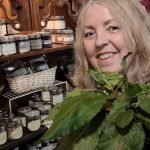
Storing plant based Medicinals
-
Storing plant based Medicinals
Posted by Hippocrates_Garden on January 24, 2023 at 10:05 pmFor storing plant-based medicinals, excluding actual making of end products (tinctures, balms, etc), would the preference be simple dehydration or freeze drying, if those were your two options, and both equally possible.
Ss6 replied 1 year, 10 months ago 11 Members · 30 Replies -
30 Replies
-
Check out Rain country. She’s on here and her YouTube channel is awesome, her playlists on herbs is so informative.
-
I think it might depend on the particular herb/plant. From what little I know, both freezing and dehydrating will work. I second the recommendation of Rain Country Homestead (Heidi’s Youtube channel). I’ve learned a ton from her!
-
I dehydrate all my herbs. I only make fresh herb based tinctures very rarely, I mostly use dried herbs for making an extract using homemade wine and honey as a solvent and I have found them to be very effective. In fact because of my recent injury, my pain extract has been excellent and it was made out of all dried herbs, homemade wine and raw honey. I realize there are varying opinions on this process: fresh or dried herbs, this solvent or that, but I can attest to what has worked for us and this includes the other medicinal extracts such as the antibiotic, the muscle relaxer/sleep inducer, et cetera). One thing to keep in mind is that when it comes to drying herbs, one can preserve the properties best by going for a lower heat setting. I typically use 110° but you can go down to 95° for the most delicate herbs. This is where I prefer to use my Nesco stackable dehydrator as I can put the less delicate things closer to the heat source while the more delicate is placed farther away making it so that I do not have to dry them all separately at different temperatures. If I am drying all of the same herbs or all herbs that do best at the same setting, then I might use my cabinet style dehydrator. In the case of herbs, I would personally never use an oven to dry and those who live in a dry climate can simply hang dry.
-
I totally agree with Heidi, Ive been a herbalist for 25 years and low heat or naturally dried plant materials will still do what nature intended to help a person if you cant get fresh… if you can do fresh thats great too… having said that, all ways to use healing plants with positive intention is helpful. Making Plant medicine by Ricoh Cech is a great book describing how each herb works best.
-
This reply was modified 1 year, 11 months ago by
 Georgina-Cyr.
Georgina-Cyr.
-
This reply was modified 1 year, 11 months ago by
-
-
I don’t have any knowledge to share but I sure would like to learn from y’all
-
I would just air dry it. I don’t even use the dehydrator. But I’m in a (usually) dry climate, and things dry out well without getting moldy.
-
I personally prefer to dehydrate my herbs. I use a dehydrator, my oven as well as air dry in the summer as well as hang dry in a brown paper bag as the temps begin to get cool.
Since I use an alcohol base for tinctures, they last quite a long while, yet I also keep them in a cool and dry place. I’ve had some for a few years and are still effective.-
For me it is simply the best way to go. It also saves on storage space. I have been doing this for quite a number of years and while I do improve on my recipes as time goes along, I still find that dried has worked just as good if not better than fresh. Opinion or not, many herbalists that have been doing it for 30 years or more use dried herbs. I was only trying to share my own years of experience here and each person needs to find what is best for them. For example, though I first started off using vodka or vinegar, I found I could not stand these so I experimented over the years and that is where I came up with the homemade wine and honey for a solvent. The combination last just as long on the shelf as one with a high proof alcohol, and sure makes them taste better, especially the pain one because feverfew is so bitter! Now it is actually tolerable to take and boy is it effective! I rarely need to use it but with some nights this pain in my knee keeping me up at night, that extract has been a lifesaver. Not only does it take away the pain but it calms everything because of the addition of valerian leaves and catmint.
-
Heidi, I agree with your methods. I have started to make wine, based on what I have learned from you and others. I like my garlic infused honey, so I can see how it can work with other herbs.
You are correct. Not everyone will do things the same. I have also made tinctures using vegetable based glycerin for those who cannot have alcohol.
I preferred to use dried herbs for tinctures, ointments, etc. yet have used fresh as well. And although I use dried herbs for teas, I love using them fresh from the plant. ♥
-
-
-
From what I’ve learned it totally depends on the plant and/or how you want to use it in the future. Some things are better dried at least slightly to reduce the chance of mold in a salve or infused oil. Other plants need to be used fresh or frozen fresh like in a poultice. Most of my herbs are stored dried if not already in a preparation.
-
Wish there was a “thumbs up” or “like” for responses and not just posts.
-
I believe the primary difference in freeze drying vs simple dehydration is the cycling of extremely cold to pretty warm results in cell walls rupturing enabling more of the water to be extracted as the relatively fast cycling results of sublimation of the water from freezing to gas, essentially bypassing the liquid stage, and thus remove almost all the water, while leaving anything less volatile behind, and the product looking essentially the same as before the process.
-
It certainly makes it more palatable! haha Plus it saves a little money not having to buy the spirits
-
Yes, I make all my own wines from my grapes, rhubarb, apples, and/or blackberries. Once in awhile I may use an organic juice I purchase elsewhere
-
You are awesome ! I love your honesty and the ability you have as an autistically detailed person 🙂
and yes the relationship and intention with the plants for both practitioner and receiver of the medicine is so very important.
For sure the fresh plant has the life energy, and various other components not available once dried,
but I do believe drying it concentrates the medicine that is left in the plant after the moisture is gone, so while you may not get all of the fresh constituents, you might likely get more concentrated medicine from the way the plants are traditionally used as a tea or decoction.
-
you might be interested in this… Richoh Cech says its plant-specific. Sometimes dehydration helps to make cell structure more fragile, and assists in extraction. dehydration also detoxifies different plants- like black cohosh and blue cohosh roots. some plants really make a superior tincture when processed fresh, due to the presence of heat-volatile constituents. Stachys officinalis (wood betony) would be a good example of that.
My book “making plant medicine” makes specific recommendations on each herb Pages 21- 24
vis a vis the advisability of extracting fresh vs dry, also seasonal harvest considerations, plant parts, etc. here’s a link to the book https://strictlymedicinalseeds.com/product/making-plant-medicine-by-richo-cech-fourth-edition/
-
I totally agree !!! Thanks for your expertise and sharing information !
Log in to reply.
